Cost of living: 'I've had to rummage in bins for food to eat'
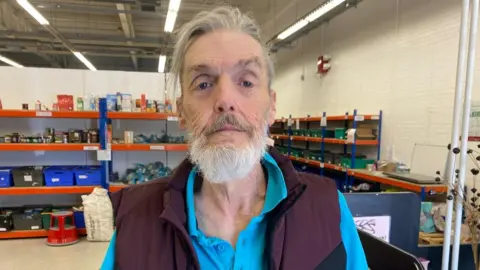 BBC
BBCColin Walker is on his way home after being discharged from hospital but there's one place he needs to visit first - his local food bank.
The 60-year-old arrives at the Colchester branch with a nurse, who is taking him back to his flat after he had a stroke.
If he hadn't stopped by to collect some food, he would be returning to an empty fridge, he says.
"I had to rummage in the bins to find food to eat before I started coming here," he says. "This food bank has kept me alive."
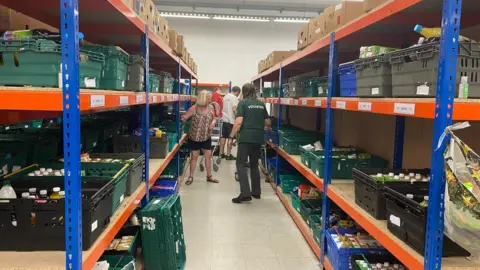
Colin is one of thousands of people who regularly access the food bank, which is the busiest in the east of England.
It is run by the Trussell Trust and is one of nearly 400 across the UK, with 1,300 places in its network where people can collect food.
Manager Mike Beckett says he is seeing a huge increase in demand at the same time as donations are dropping.
Many families are no longer able to afford to buy extra items to drop off at the site or in supermarkets for collection, with the rising cost of food.
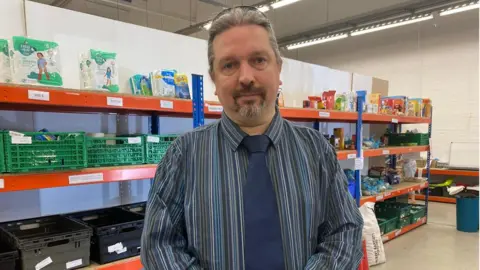
On the day Colin visited, the food bank - which provided 16,500 people with meals last year - had run out of shampoo, washing powder, washing up liquid, toothbrushes and deodorant. It had extremely low stocks of pasta sauce, tea bags and squash and put out an emergency appeal online.
"We used to have busy days maybe once a week, but now they are all the time. The summer used to be quiet and we would spend the time preparing for winter and building our reserves but we are eating into those reserves that we were saving," Mike says.
Some of the people who use the food bank have no access to cooking facilities, and they can only be given food like noodles that can be prepared with a kettle.
Many are in full-time employment but are struggling to make ends meet, with nurses, teachers and police officers all having recently visited the branch.
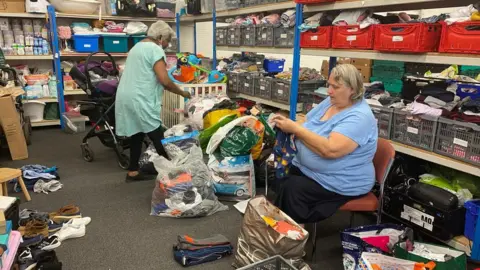
Last year, 43% of people fed were children and Mike worries for their future with the cost of living crisis set to get worse over the winter.
"I'm concerned about what is coming down the road. December is always our busiest time anyway, and I don't know how people will cope with the energy price rises in the autumn, especially if we have a cold winter," he says.
Mike says the food bank helps stop children from being taken into care, helps them stay in school and helps adults keep jobs. But the service is so stretched that these prevention strategies are at risk.
Amanda Bonner, a community housing officer, agrees. She is visiting the food bank to collect items for a family of three, where the parents work part-time but can't afford a bus fare to the unit.
"This has become a big part of my job now," she says. "I have to make sure people are paying their rent and unless I come here to get food for them there is a danger they will stop paying that because they need to spend that money on food. This place is crucial," she says.
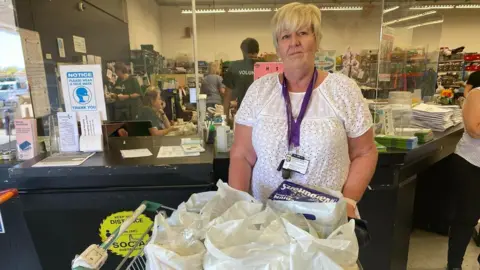
Most people only use the food bank a few times and then they get back on their feet, Mike says. But others need extra support, and not just in the form of food.
"Anyone can throw food at the problem but we are trying to look at this from all angles," he says.
'She was living on sugar water'
He recalls an elderly lady who was brought in by paramedics because she had collapsed in the street. When they took her home her cupboards were completely empty.
"She was waiting on her pension and could not afford to buy food and was surviving on glasses of water with a teaspoon of sugar in them.
"We fed her biscuits and porridge and gave her a food parcel, but we were also able to refer her to Citizens Advice, who have a base here, so she could get the support that she needed," he adds.
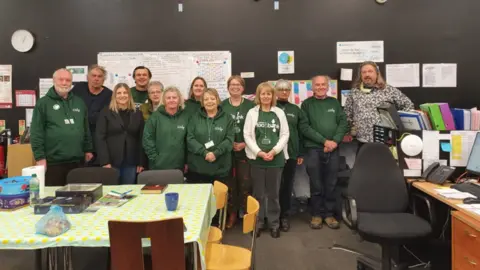
The food bank relies on more than 250 volunteers including Eunice Moore, who runs a baby bank in the unit.
"People are struggling so much, it is heartbreaking," she says. "They can't afford to feed or clothe their babies and children so we have all sorts of clothes and school uniform here."
Colchester Borough Council recently pledged £10,000 to prop up the food bank, which Mike says he is "extremely grateful" for.
His long-term ambition is to close it entirely by 2030 and he dreams of living in a country where nobody needs to visit one.
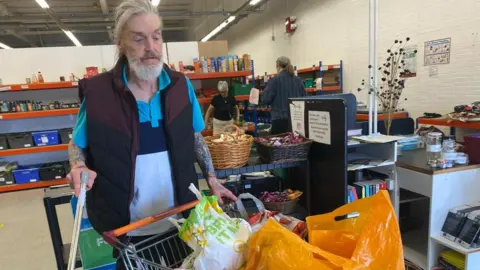
In the short-term, he would like to see waiting times reduced for universal credit, an end to the two-child limit for welfare benefits and a benefit uplift to tackle inflation.
The government says all UK households will get a grant which will reduce energy bills by £400 from October and a £650 payment will be made to more than eight million low-income households who receive benefits.
"If someone is drowning, if someone is in a hole, we will be there. But I really hope one day we won't need to be and people will never need to visit a food bank again," Mike adds.

Find BBC News: East of England on Facebook, Instagram and Twitter. If you have a story suggestion email [email protected]
